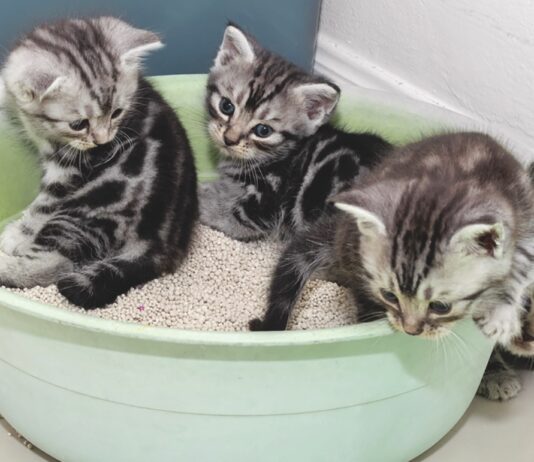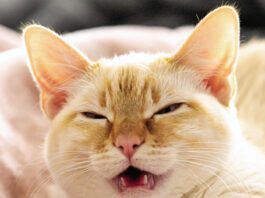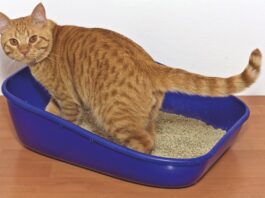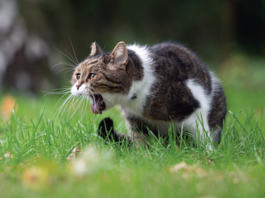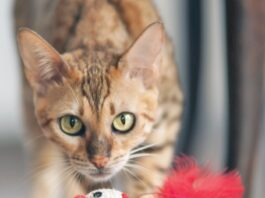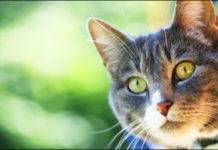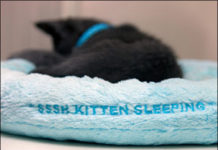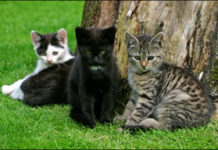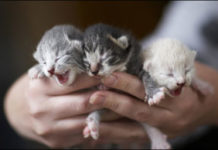Ask Elizabeth: August 2010
We cats are special in many ways, of course, but our eyes have always been particularly fascinating to people. Pearls pupil shape is unique to the family Felidae and is meant to maximize vision in low light. Did you know that cats can see at eight times dimmer illumination than humans? This gift is part of our heritage as nocturnal, carnivorous mammals. Our ancestors success in the wild depended on being able to hunt at dusk and dawn, times of day when many potential dinner species are most active. Adaptations to the eye improved our wild relatives night vision
Ask Elizabeth: July 2010
We recently adopted a nine-week-old kitten. Shes only a tiny ball of fluff, but already shes using her teeny nails to scratch the brand-new couch that we just bought to replace a couch our recently deceased cat had ruined. I am opposed to declawing cats, but my husband is adamant that we will not be buying any new furniture in the near future. We both love our sweet Fiona, but need some advice. Do you have any tips to help protect our furniture?
Ask Elizabeth: June 2010
Kudos to you for adopting a special needs little fella. Bob most likely was exposed to feline panleukopenia virus, sometimes called feline distemper or feline parvo virus, either shortly before or shortly after birth. This exposure caused a condition called cerebellar hypoplasia, or underdevelopment of the cerebellum. The cerebellum is located at the base of the brain, is responsible for coordination of movement and plays a role in balance. Kittens that are exposed to panleukopenia virus during development of the cerebellum (generally the last two weeks of gestation up until about four weeks of age) wind up with a cerebellum that is too small and doesnt function properly. Cerebellar hypoplasia can result from exposure to panleukopenia virus itself or from modified live panleukopenia vaccines given to cats during pregnancy or to kittens prior to four weeks of age.
Ask Elizabeth: April 2010
Is it really possible that my cat has acne? Crumbcake is a handsome, slightly chubby, brown tabby cat who we adopted from the SPCA five years ago. He has always been quite healthy; we take him to our veterinarian every year for his check-up, and we havent had any worries about him. Imagine our shock when at this years examination, our veterinarian diagnosed "chin acne" on our cat! Crumbcakes chin is a little swollen, a little red, and he has a number of what look like blackheads along the edge of his lower lips.
Ask Elizabeth: April 2010
Is it really possible that my cat has acne? Crumbcake is a handsome, slightly chubby, brown tabby cat who we adopted from the SPCA five years ago. He has always been quite healthy; we take him to our veterinarian every year for his check-up, and we havent had any worries about him. Imagine our shock when at this years examination, our veterinarian diagnosed "chin acne" on our cat! Crumbcakes chin is a little swollen, a little red, and he has a number of what look like blackheads along the edge of his lower lips.
Ask Elizabeth: March 2010
Sometimes, I find things which appear to be grains of rice stuck to the fur around my cats hind end. Figaro does go outside, but I cant figure out how he could get rice stuck back there. Do you think hes been rooting around in garbage cans looking for food?
Ask Elizabeth: February 2010
Dear Elizabeth, I have four cats in my household, and one of them, Tabitha, has a tendency to chew and eat plastic. Ive caught her chewing on plastic bags that Ive carried in from the store, as well as items in the basement that are wrapped in plastic. I worry that she could choke to death or hurt herself somehow. Why does she do this? One of my other cats is aggressive and chases her. Tabitha is afraid and will not fight back; could her plastic obsession be stress-related?
Ask Elizabeth: 12/09
Rabies is in the family of RNA viruses (Rhabdoviridae) and the genus, Lyssavirus. Rabies exists nearly everywhere although some areas (including New Zealand; parts of the Caribbean, Scandinavia, and British Isles; Japan; and Hawaii) are thought to be free of the virus.
Ask Elizabeth: January 2010
Dear Elizabeth, My cat, Abby, recently had a litter of kittens and the kittens are so different from each other in terms of size, color and personality, that I think they must have come from different fathers. One kitten is fine-boned, white with grey patches and long haired, while two of the others are short-haired, stocky and black. Abby showed up at my door, pregnant, so I have no idea if she actually mated with more than one male. Is it possible that the kittens have different dads? And what is an average size litter for a cat? Abby had three kittens, which I think of as average, but the cat down the road recently had nine kittens!
Ask Elizabeth: 11/09
I can think of no better way to add excitement and joy to an empty nest than by raising a litter of orphaned kittens. By fostering kittens for a shelter, you will ease the burden on shelter workers since caring for orphans can be time-consuming. You will also provide an environment free from many of the contagious diseases that are so problematic, and often fatal, to vulnerable youngsters in shelters. Raising orphans is labor intensive, but as you see your tiny, helpless balls of fluff transformed into playful, inquisitive youngsters, Im sure youll consider your time well-spent.
Ask Elizabeth: 10/09
One of the main problems is ensuring that the diet is nutritionally balanced. Although it may appear that cats can live and even thrive scrounging for food on their own, a cats nutritional requirements are actually quite complex. When cats eat prey, they ingest the whole animal - and it can be hard to duplicate this "complete" diet with muscle meats and other foods obtained from a grocery store. It also takes a lot of time, expense and knowledge to prepare a well-balanced diet, and many published recipes for home cooked pet diets have been found to be nutritionally incomplete. Even when the diet is balanced, it needs to be prepared so that picky cats cant selectively eat only certain ingredients. Unbalanced Diets & Nutritional Diseases. The veterinary literature is full of documented cases linking improper diets to nutritional diseases, some of which are fatal. Well-meaning owners feeding all-meat diets have caused serious calcium deficiencies resulting in catastrophic bone fractures. While bones contain calcium, feeding cooked bones may cause intestinal blockages or perforations, leading to peritonitis (a potentially fatal infection in the abdomen). Large amounts of tuna fish can cause thiamine (vitamin B1) deficiencies, resulting in neurologic disease (tuna cat foods are supplemented with thiamine to prevent problems). Deficiencies of the amino acid, taurine, result in blindness and cardiomyopathy (a potentially fatal weakness of the heart muscle). Interestingly, while muscle meats contain large amounts of taurine, grinding the meat can reduce taurine levels enough to cause deficiencies.
Ask Elizabeth: 09/09
My cat has just developed a black discharge in one ear. Ive never seen or heard of this kind of thing before. I have taken him to my veterinarian twice, and on each occasion, she cleaned the ear and microscopically examined the discharge. Im assured that there are no ear mites present. Whats the reason for the discharge and whats the prognosis?

